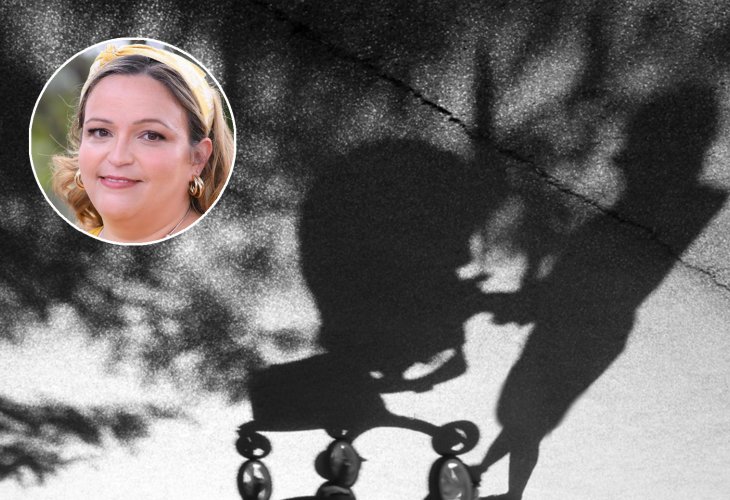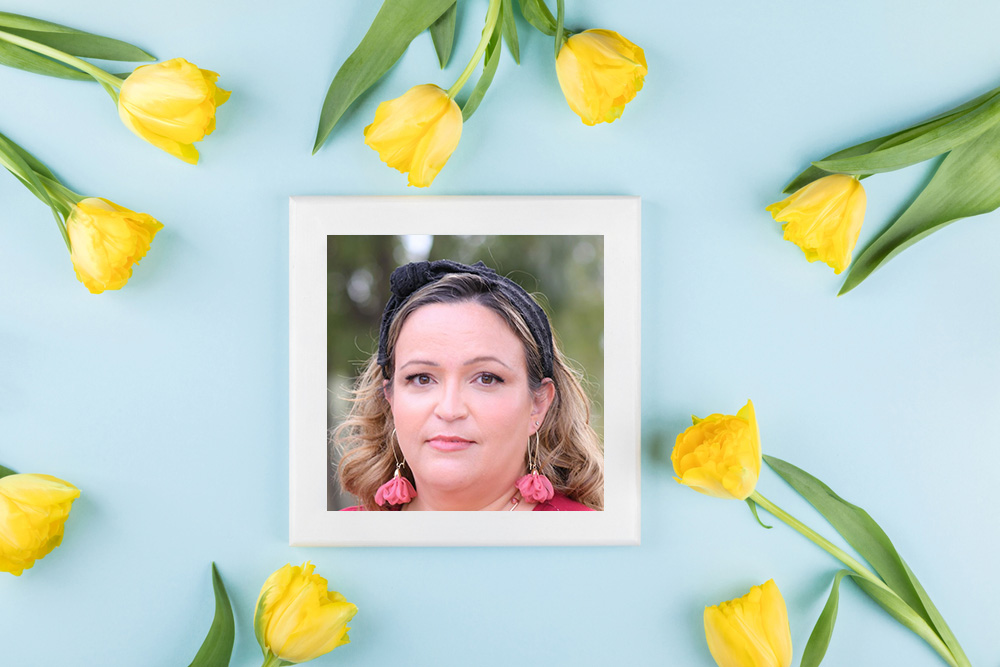"My Child Said 'I Want My Mom Back,' and Burst into Tears"
Liza Amihai struggled with postpartum depression for ten months, was hospitalized in a psychiatric ward, and underwent eight series of treatments. "I didn’t believe I would get through it; there were days I didn’t want to live," she shares.
 In the circle: Liza Amihai (Illustrative photo: shutterstock)
In the circle: Liza Amihai (Illustrative photo: shutterstock)When Liza Amihai felt after her fourth childbirth that she was developing symptoms of postpartum depression, she was confident she would overcome it easily. "I come from a therapeutic and emotional field," she explains, "I'm a counselor by profession and coach children with attention and concentration problems. I wasn’t alarmed because it was clear to me that I could handle the situation and get out of it." She never imagined what awaited her and didn’t realize she was only at the start of her journey.
"Emotions Stopped with the Birth"
"All my previous pregnancies were completely routine, as were the periods after them," says Liza. "From the moment my children came into the world, I felt a very strong connection to them, and I would always ask myself: 'How did I manage to live without them until now?' I want to stress that it’s not necessary to feel this way, and it doesn't mean those who experience different feelings are in depression, but having experienced this in previous births, I felt something was wrong after the fourth one. Yishai was a very cute baby, but I couldn’t connect with him, which was a major red flag for me. Everyone who came to visit me at the hospital realized quickly that I would push Yishai into their hands constantly. I just wanted to sleep peacefully.
"Yishai was born by cesarean, and from the outset I had planned to move to a maternity hotel after three nights in the hospital. Everything was very planned and clear, but already on the second day post-birth I signed for early discharge and hurried home. I felt I couldn’t stay alone with the baby in the hospital anymore."
From the moment Liza was discharged from the hospital, her condition worsened rapidly. "From the first moment, I understood that something was completely wrong with me and that it wasn’t just regular melancholy," she shares. "I didn’t want to do anything and had no desire for anything. I didn’t even want to get out of bed in the morning. Everything seemed very hard. Initially, I tried to still function and do house chores and care for the kids, but I felt like a robot, disconnected from the kids and my husband. As if all my feelings had stopped once I gave birth."
 (Illustrative photo: shutterstock)
(Illustrative photo: shutterstock)It sounds so terrible...
"Indeed, it was very frightening. But because I'm in the emotional field and have a strong self-awareness, I comforted myself that I was 'above it' and could handle it myself. The moment I realized I needed professional help was when Yishai was six weeks old and I met a friend who is also in therapy. Of course, I immediately handed Yishai to her, as I had been doing throughout. She looked at me and Yishai and instantly said: 'Something happened to you! Look how you're giving up on your son!' She forced me to call the mental health center, and I did so the very same day, but they told me the next available appointment was two months away. I hung up and burst into tears. The thought of enduring another two months seemed like a mountain, and then, by chance, they called back within moments to say: 'An appointment opened for tomorrow; come see the psychiatrist.' The next day I met with a psychiatrist who quickly determined it was postpartum depression. It was very clear."
Liza pauses for a moment to emphasize that usually, one must see a family doctor who can refer to a psychiatrist, but due to her complex situation, the processes were expedited.
"I must mention that I was lucky to have an amazing psychiatrist," she notes. "He instructed me to start medication and explained that usually, it takes three weeks to take effect. In my case, I experienced significant deterioration during those three weeks that made me cry all day and wake up every morning not wanting to live. It was terrible. Afterwards, the psychiatrist concluded the medication wasn’t working and changed it for me, and when the second treatment also failed to take effect, he talked to me for the first time about hospitalization. At first, I refused to hear about it. But the psychiatrist explained that I needed supervision. To underscore the severity, he contacted my husband and told him: 'Your wife needs supervision 24 hours a day; either you stop working, or find a solution.' That was when we understood there was no choice. My husband contacted my mother, who until then knew nothing, and explained the situation. It was decided that I’d go with Yishai to my parents as a substitute for hospitalization."
A Ray of Light in Darkness
The situation where Liza was staying away while the kids were with her husband was far from ideal. "Our 'big' children were still very young," she explains. "Yinon, the eldest, was only nine, Hillel was six, and Lavi was two. Each had their needs and needed a mother figure. But I had no way of being with them at home."
After a while at her parents, Liza returned home and soon after informed the psychiatrist she agreed to hospitalization. "My condition was very poor, and I felt that without treatment, I could harm myself," she explains. "I didn’t want to do such a thing to my older children because I remembered that I loved them. So happened what I never could have imagined: I found myself fully hospitalized in the psychiatric ward at Ma'ayanei Hayeshua Hospital. Initially, the hospitalization was without the baby and meeting the kids, and after two weeks, I moved to a day hospitalization which lasted two months. During those days, we managed to enroll Yishai in daycare with his two-year-old brother, and the older ones were in school. I would send them to their frameworks in the morning and then head to Ma'ayanei Hayeshua, returning in the afternoon. It could seemingly appear like a regular mom going to work, but it was so far from that.

Did the hospitalization help you finally start functioning again?
"I wish I had started functioning then. By that time, Yishai was already six months old, and I still couldn’t care for him at all. My psychiatrist diagnosed that the condition had returned to being not good, but since I was no longer in life-threatening danger, there was no need to return to hospitalization. Hence, the children once again saw me at home, collapsed and completely non-functional. About a month passed like this, until one day my husband told me: 'You must talk to the older kids.' I felt it too, and initiated a talk with Yinon, my eldest. I asked if he had any questions about what was happening, and he replied: 'I don’t understand what illness you have.' I explained that every person is made of body and soul, and when the soul is sick, it affects the body. That's what happened to me, and that's why I look like this. Yinon really accepted and understood it.
"Then I talked to Hillel, the second son, and he just broke down in tears, saying: 'I want my mom back.' I replied: 'Here I am,' but he continued crying: 'You’re not my mom.' That was the first time I realized that depression affects not only me but the entire family. After these conversations, I understood the enormous importance of me being near the children, even if I couldn’t fully function. So, I forced myself every day to lie on the couch and be present in their lives as much as possible."
What helped you hold on during such a dark period?
"All the acquaintances and family surrounded us strongly during those days, which strengthened and gave a lot of power. From the moment the community understood I was sick and not functioning, they rallied to help in a very touching and unusual way. For three months, they brought lunchtime hot meals to the house daily and sent volunteers to clean, always at times when I wasn’t around so as not to embarrass me. They even left the food outside the door, so I wouldn’t know who sent it. Even when Yishai was three and I planned a thanksgiving party, I wanted to invite all those who helped me, but I was told they refused to come. To this day, I don’t know who they were.
"Family members also supported us endlessly. My mother-in-law would come daily to practice reading with Hillel, who had just started first grade. Sisters-in-law would regularly take the kids to their homes, and my younger brother sent supportive messages every day, morning and evening. Even during the darkest and most dreary period of my life, they felt like a true ray of light. There’s no chance I could have coped without them."
The Sun Finally Shone
After ten months of severe and dark emotions, Liza felt the first slight improvement. "One morning I woke up, and suddenly, like in stories, I noticed the sun shining," she describes. "I know it sounds cliché and metaphorical, but the moment I saw the sun outside, I started feeling for the first time that I was heading in the right direction. At that time, I was in the midst of the eighth medicinal treatment, which likely proved more beneficial than the previous ones. Since then, more and more slow advancements followed. For example, I remember one day deciding to go exchange something in the mall. Such a decision was very unusual for me as I had avoided crowded places until then. I remember standing in line near the cashier, hearing the background song playing, and suddenly beginning to hum and sing along. At first, I was stunned by myself, and in the second moment, I burst into tears because I realized I was on my way to climbing out of this dark pit, and what my psychiatrist always instilled in me: 'You'll come out of this; I believe in you,' was really about to happen."
And indeed, it did happen. Step by step, Liza began returning to herself, managing to resume activities and regain functionality. "I had to work hard not to demand too much of myself," she clarifies, "and so, for instance, I bathed Yishai for the first time when he was one and a half. It sounds terrible, but I was immensely proud of myself. Today, Baruch Hashem, Yishai is six, and I have completely returned to myself. I joyfully care for my children and manage the household. In recent years, I've returned to work fully after having received a full loss of work capacity due to the depression. I believe that now I understand my patients more than ever and certainly judge them less, while wholeheartedly believing in them."
Liza believes that treating depression can only be possible once awareness of the issue increases, which is also why she shares her story and delivers lectures on the topic. "A person experiencing depression is not a bad person nor at fault, but surely someone who needs help, and to receive it, he must first acknowledge his condition. If even one person reads this and finds it helpful, it’s worth all the exposure. Baruch Hashem, I came out of the depression, and now I want to help others."

